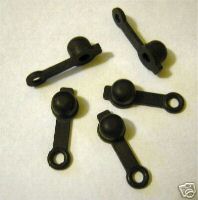Braking: Difference between revisions
From GummyCarbs
| (5 intermediate revisions by the same user not shown) | |||
| Line 1: | Line 1: | ||
=Fasteners= | |||
==Hydraulic== | |||
Most motorcycle brakes banjo bolts are 10mm x 1.25 pitch. Brembo brakes are 1.0 pitch. | |||
Typical bleed nipples will be 8mm x 1.25 pitch. | |||
==Fixing== | |||
Bolts used to fix calipers to the bike should be high quality. Look for 8.8, 10.9 or 12.9 grade bolts. Avoid stainless steel unless you know what you're doing, since stainless typically does not have the required tensile strength. | |||
Refer to [http://www.algeo.com/~joe/KIAT/kiat_2.htm Keeping It All Together] for details on why stainless should be avoided: | |||
<blockquote><i>When contemplating replacing OEM fasteners with stainless steel, remember that common stainless steel does not have the strength of common alloy steels and should not be used for critical, highly stressed applications. The stainless steel also has higher friction than steel does which gives less preload at the same torque. When in doubt, keep the OEM steel stuff for critical applications.</i></blockquote> | |||
=Bleed Nipple Covers= | |||
Bleed nipple caps keep water and dirt from promoting corrosion. | |||
Honda part numbers: | |||
* 45112-MEL-003 (CBR1000RR, CBR600RR, etc) $0.74 each at Ron Ayers. | |||
** This is a simple cap. | |||
* 43353-461-771 (NT650V, VFR750, etc) $3.18 each at Ron Ayers. | |||
** This is a cap with a 'leash' which attaches around the base of the bleed nipple. | |||
[[Image:Brake_BleedNippleDustCap_Goodridge.JPG|right]] Goodridge makes their BN-CAP dust cap, which is similar to the 'leashed' Honda model above. These are sold in the US by [http://www.pegasusautoracing.com/productdetails.asp?RecId=5040 Pegasus Auto Racing] for $1.49 each. | |||
<br style="clear:both;"/> | |||
=Brake Caliper Pistons= | =Brake Caliper Pistons= | ||
Latest revision as of 18:20, 31 October 2008
Fasteners
Hydraulic
Most motorcycle brakes banjo bolts are 10mm x 1.25 pitch. Brembo brakes are 1.0 pitch.
Typical bleed nipples will be 8mm x 1.25 pitch.
Fixing
Bolts used to fix calipers to the bike should be high quality. Look for 8.8, 10.9 or 12.9 grade bolts. Avoid stainless steel unless you know what you're doing, since stainless typically does not have the required tensile strength.
Refer to Keeping It All Together for details on why stainless should be avoided:
When contemplating replacing OEM fasteners with stainless steel, remember that common stainless steel does not have the strength of common alloy steels and should not be used for critical, highly stressed applications. The stainless steel also has higher friction than steel does which gives less preload at the same torque. When in doubt, keep the OEM steel stuff for critical applications.
Bleed Nipple Covers
Bleed nipple caps keep water and dirt from promoting corrosion.
Honda part numbers:
- 45112-MEL-003 (CBR1000RR, CBR600RR, etc) $0.74 each at Ron Ayers.
- This is a simple cap.
- 43353-461-771 (NT650V, VFR750, etc) $3.18 each at Ron Ayers.
- This is a cap with a 'leash' which attaches around the base of the bleed nipple.

Goodridge makes their BN-CAP dust cap, which is similar to the 'leashed' Honda model above. These are sold in the US by Pegasus Auto Racing for $1.49 each.
Brake Caliper Pistons
When you squeeze the brake lever, hydraulic fluid is pushed from the master cylinder, though the brake hose, increasing pressure in the brake caliper. This pressure forces the brake piston outward, pushing the brake pad against the brake disc.
Because of their relatively inaccessible location and exposure to water, salt, and corrosive brake dust, brake caliper pistons are highly susceptible to corrosion.
Stainless Steel
The most common material for corrosion-resistant aftermarket caliper pistons is stainless steel.
Phenolic Plastic
Amazingly, phenolic plastic can apparently sustain the pressure and temperatures generated in braking systems!
- Vyncolit has produced phenolic brake pistons since the 1970s. Their brochure describes the advantages.
- Sumitomo began production in early 2007.